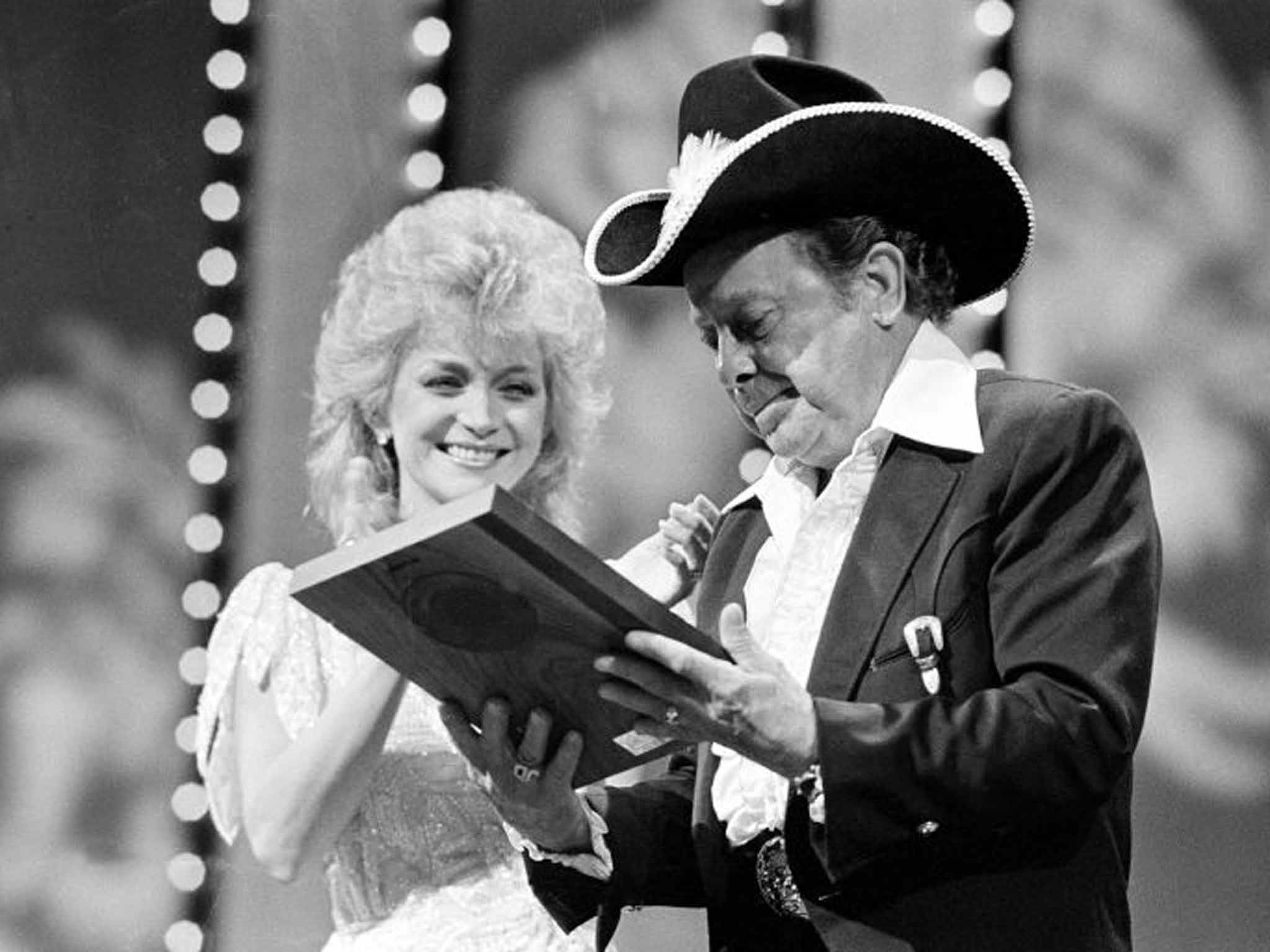Little Jimmy Dickens: Diminutive singer who dazzled audiences and became one of country music's biggest stars of the 1950s and 1960s
In 1983 his contributions to the genre were recognised through his election to the Country Music Hall of Fame

Newspaper and magazine articles about Little Jimmy Dickens almost invariably began by contrasting his diminutive stature – 4ft 11in – with his sizeable contribution to country music. The man who once performed under the soubriquets "Jimmy the Kid" and "The Singing Midget", and whom Hank Williams nicknamed "Tater" after one of his earliest hits, was both one of the genre's biggest stars during the 1950s and '60s and a major innovator.
Usually cited as the first country star to circumnavigate the globe, Dickens was also a leading and early exponent of a style of dazzling stage attire that has since become a country music cliché; June Carter Cash once said he looked like "Mighty Mouse in pyjamas."
As with his friend Ernest Tubb, Dickens played an important role in nurturing the talent and careers of others. He helped, for example, to establish the legendary husband and wife team of Felice and Boudleaux Bryant as premier Nashville tunesmiths, taking "Country Boy", one of their earliest songs, into the Top 10 in 1949. Two years later he appeared on a Phoenix, Arizona television show and was sufficiently impressed by its host to recommend him to Columbia records, kick-starting the career of future country superstar Marty Robbins.
Fronting one of the hottest bands of the era, the Country Boys, Dickens also gave free rein to his musicians, building the considerable reputations of pickers like Grady Martin, Merle "Red" Taylor, Kenneth "Thumbs" Carlile and Buddy Emmons. Martin's astonishing twin-guitar work with Robert "Jabbo" Arrington on proto-rockabilly numbers like "Hillbilly Fever" (1950) continues to impress today and he became something of a mainstay on Dickens' records. When Martin temporarily left Dickens's band he was replaced by the eccentric Carlile, who played with his guitar lying flat upon his lap; Emmons, a steel guitarist of genius, was, unusually for the period, encouraged to cut instrumental tracks.
James Cecil Dickens was born the son of a West Virginia coalminer in 1920. He was the youngest of 13 children, a situation that would find humorous expression years later in his classic "A-Sleepin' At The Foot Of The Bed" (1950). As a youngster he set his sights on a career as a musician: "As a kid, I wanted to be a country music entertainer because I was raised up on the Grand Ole Opry and gospel singing. I just wanted to be a professional entertainer and someday maybe accomplish something."
As with many of his contemporaries, much of his early work was on radio and in 1939 he began a stint on WJLS in Beckley, West Virginia. He regularly launched the day's broadcast with an imitation cockcrow and relished the opportunity to work alongside popular acts such as the Lilly Brothers and Johnny Bailes and his Happy Valley Boys. He eventually moved to WMMN Fairmont, where he formed a partnership with the guitarist and singer T Texas Tyler before moving successively to Indianapolis, Cincinnati and Saginaw.
It was while in Saginaw that he met his idol, Roy Acuff, by that time the biggest star in country music. Acuff was to prove instrumental in landing the younger man both his first appearance on Nashville's famed Grand Ole Opry and a deal with Columbia Records. Several members of Acuff's band, the Smoky Mountain Boys, notably the harmonica-player Jimmie Riddle and, on steel guitar, Bashful Brother Oswald, backed him on his earliest sides.
His first sizeable hit, "Take An Old Cold Tater (And Wait)" (1949) was a foretaste of what was to come, novelty numbers becoming a major part of his repertoire. They included "I'm Little But I'm Loud" (1950), his fine cover of bluesman Piano Red's "Rockin' With Red" (1953), "Out Behind The Barn" (1954) and, in 1965, his biggest hit, the million-selling "May The Bird Of Paradise Fly Up Your Nose". The last of these featured, once again, the fine picking of Grady Martin, whose use of an Echoplex allowed him to replicate his earlier twin-guitar work with Arrington
There was, however, another side to Dickens: inspired by Acuff he also tackled serious, often sentimental, numbers, imbuing his characteristic nasal tenor with an aching throb. Fans seemed to prefer the light-hearted material, but numbers like "My Heart's Bouquet" (1949), "The Violet And The Rose" (1962) and Harlan Howard's "Life Turned Her That Way" (1964) enjoyed moderate chart success and his 1970 recitation, "(You've Been Quite A Doll) Raggedy Ann", remains a classic of its kind.
Having joined the Opry in 1949, Dickens left in 1957 to tour with the Philip Morris Country Show before rejoining it in 1975; he remained a much-loved performer there, cracking self-deprecating jokes and singing his old hits into his 10th decade. In 1983 his contributions to the genre were recognised through his election to the Country Music Hall of Fame.
Latterly he made appearances in the music videos of musician friends and could be heard on the albums of his fellow West Virginian Brad Paisley as a member of the tongue-in-cheek outfit, the Kung-Pao Buckaroos. He made his final appearance on the Opry stage on 20 December as he celebrated his 94th birthday, days before he suffered a stroke. µ PAUL WADEY
James Cecil Dickens, singer and guitarist: born Bolt, West Virginia 19 December 1920; thrice married (two daughters); died Nashville, Tennessee 2 January 2015.
Join our commenting forum
Join thought-provoking conversations, follow other Independent readers and see their replies
Comments